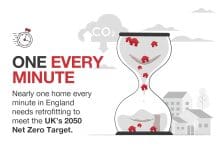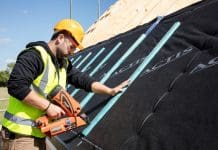The UK Green Building Council (UKGBC) has marked a new phase of its Accelerator Cities project, which brings together local and combined authorities and stakeholders to drive action to upgrade our ‘draughty, energy-hungry housing stock’
With calls for a ‘green recovery’ from the Covid-19 pandemic rocketing up the agenda, the need for investment in the energy efficiency of our homes is becoming ever clearer.
The economic cost to the NHS of cold homes, at a time of great pressure, is around £1.4bn addition, reducing carbon emissions associated with energy used in our homes is one of the biggest challenges facing the nation in terms of making the transition to a net-zero carbon economy.
Accelerator Cities project
The Accelerator Cities project will:
- Support towns and cities to develop their own home retrofit programmes
- Help co-ordinate action between them – including sharing best practice, lessons learned, evidence and resources
- Support a co-ordinated approach in respect of links to financial institutions and funding opportunities
- Encourage greater partnership between industry and NGO groups on home retrofit
- Help to co-ordinate cities’ engagement with central government on this topic.
To achieve net-zero carbon by 2050, we will need to improve almost all of the UK’s 29 million homes, meaning we need to retrofit more than 1.8 homes every minute between now and 2050.
Accelerating action on retrofit can also support more than 150,000 skilled and semi-skilled construction jobs to 2030.
In short, boosting the rate of home retrofit will provide crucial support for health and wellbeing, accelerate our transition to net-zero and create jobs in all parts of the country.
Energy-efficient measures
John Alker, director of policy & places at UKGBC, said: “There is a critical need to improve the nation’s health, reduce carbon emissions and create long-lasting economic benefits.
“Home retrofit is a triple-win that supports all three goals. Although the central Government still holds many of the keys to unlocking this, cities and local authorities are stepping up to play a crucial leadership role.
“Accelerator Cities is all about supporting and enabling greater coordination between local government on home retrofit. The project will help the city and local authorities as they grapple with issues such as householder engagement, skills and finance – helping to build an evidence base, learn lessons and share common approaches.”
Councillor Andrew Western, leader of Trafford Council and Greater Manchester lead for the Green City-Region, said: “Installing energy-efficient measures into the fabric of our homes to make them warmer and more cost-effective is one of the key actions identified in Greater Manchester’s Five Year Environment Plan to drive down our emissions and become carbon neutral by 2038.
“As a city-region, we take pride in the great strides being taken in Greater Manchester and the appetite to both share experiences and learn from others.
“As our homes continue to play the role of office and school, the need to help people make energy-efficient improvements and to build back greener is even more of an incentive to be part of the Accelerator Cities project.”
The UKGBC authority partners:
Birmingham City Council, the Greater Manchester Combined Authority, the Greater London Authority, Leeds City Council and the West Midlands Combined Authority.
A range of other expert stakeholders are also on board including the Active Building Centre, Bioregional, Energy Saving Trust, Green Alliance, Otley Energy, Places in Common, RetrofitWorks and UK100.
The Accelerator Cities project is primarily funded by EIT-Climate KIC.














